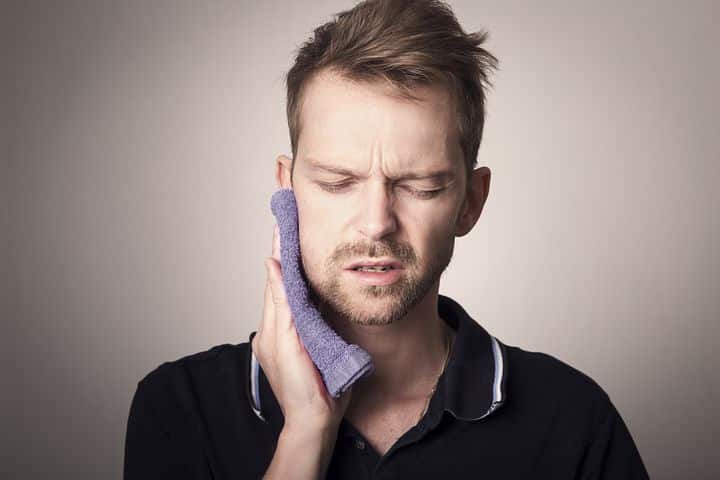Teeth grinding is something that many people fear. The effects that come with the condition can be painful. However, it is very common, and it is not as scary as it may seem. What exactly does it mean to grind your teeth, though?
The answer is pretty simple — it’s called bruxism, and it happens when you are clenching your teeth, often unconsciously. It can happen when you are awake, and is also common during sleep. It can have some long-term effects, including gum damage, flattened teeth, and TMJ problems.
Sure, it is a painful condition, but you don’t need to worry too much because there are ways to address the problem.The first step to addressing the issue of grinding your teeth is recognizing that you are. Here, we’ll go over a few signs and symptoms to look out for that may point to teeth grinding. And of course, we will offer solutions to relieve the stress and pain that the symptoms may bring.
Signs & Symptoms to Look For
Mouth & Jaw Pain
The mouth and jaw pain that you feel when you are grinding your teeth is likely unbearable. If you are experiencing tooth aches and a sore jaw, this is likely a sign of bruxism. Not to mention the strain this puts on your muscles, leading to even more pain — like headaches!
Morning Headaches
The pain you notice when you wake up can also manifest as a headache. If you wake up with a bad headache, and you are noticing some of these other bruxism symptoms, that’s probably a sign that grinding your teeth is doing some serious damage. Take note if you are consistently experiencing these headaches.
Tooth Sensitivity
Your teeth may become more sensitive to certain foods and drinks. This is because worn tooth enamel leads to teeth that are more likely to collect bacteria — enamel exists to protect from that. The hot and cold temperatures of foods and drinks may become more irritating due to the worn enamel and exposed roots. If you are struggling to enjoy a hot cup of coffee or a delicious pint of chocolate ice cream, you might want to consider that you may be grinding your teeth.

(Speaking of a hot coffee, spoiler alert: cutting out caffeine can help you stop grinding your teeth because it reduces stress!)
Flattened or Chipped Teeth
It’s common to feel the differences in our mouths when changes in our teeth occur — it may not be noticeable to others, but we often notice it in ourselves, and it can be bothersome. If you are noticing changes, don’t ignore them — pay attention to changes in your teeth, especially if they appear shorter than normal, flat, or chipped! This could be a sign that you are grinding your teeth. Fixing broken or chipped teeth is going to be expensive, so catching this symptom as early as possible is important.
Popping Sounds in the TMJ
If you’re noticing a locked jaw or popping sounds in that area, you may be experiencing temporomandibular joint (TMJ) pain. The TMJ connects the jawbone to the skull, and though it can be painful, the good news that most pain in this area is completely temporary and treatable.
What to do about it
Visit Your Dentist
There are quite a few things you can do if you are grinding your teeth. One of the first things you may want to do is see your dentist — they may notice things that you have not, including dental attrition, tooth abrasion, and worn enamel. While it is extremely useful to be able to recognize the signs on your own, your dentist will save you further pain and know exactly how to help.

Reduce Stress
Reducing stress is another option. Stress may be the root cause of your teeth grinding, and finding ways to relax can help relieve tension — physically and mentally.
We recommend implementing more self-care into your routine. Self-care can take many forms, such as:
- Reading
- Journaling
- Taking a warm bath or shower
- Exercise
- Yoga
- Sleep

Diving into the alternate universe of a book, getting your thoughts out on paper, and even taking a break to enjoy a warm shower or bath can eliminate stress. Try using a BodyRestore shower steamer to make your shower even more relaxing. Sleep is a big one, too. You may not be getting enough sleep, and sleep is very important here because your sleep habits and teeth grinding may be linked. If so, you can improve sleep hygiene with a regular sleep schedule, having a set evening routine, and eliminating excess time in bed. If there is anything else that you know takes your mind off of stressful life events, be sure to add that to this list, too!
Mouth Guards
Mouth guards are an easy fix and will reduce a lot of the pain that comes with teeth grinding. A night guard is similar to one worn in sports, but is meant to protect you from injury inside the mouth — grinding or clenching your teeth — rather than from an outside force. You can get one custom made just for you or even find one at the store. Consult your dentist about the best option.

So there you have it! There are signs you can watch out for if you suspect an issue with grinding your teeth, and your dentist can also offer a lot of advice. Make sure to practice stress relief and positive sleep habits to stop bruxism before it starts.

